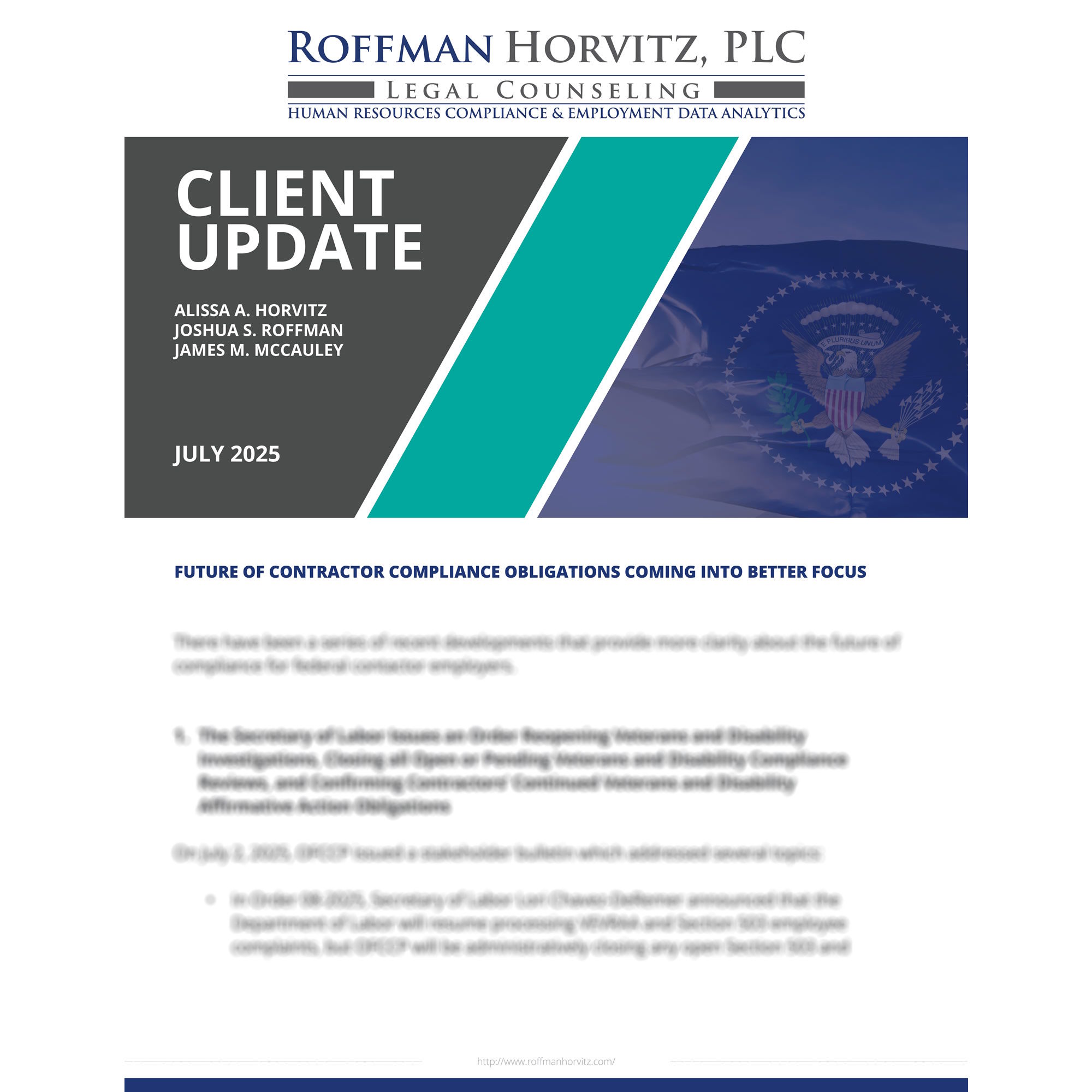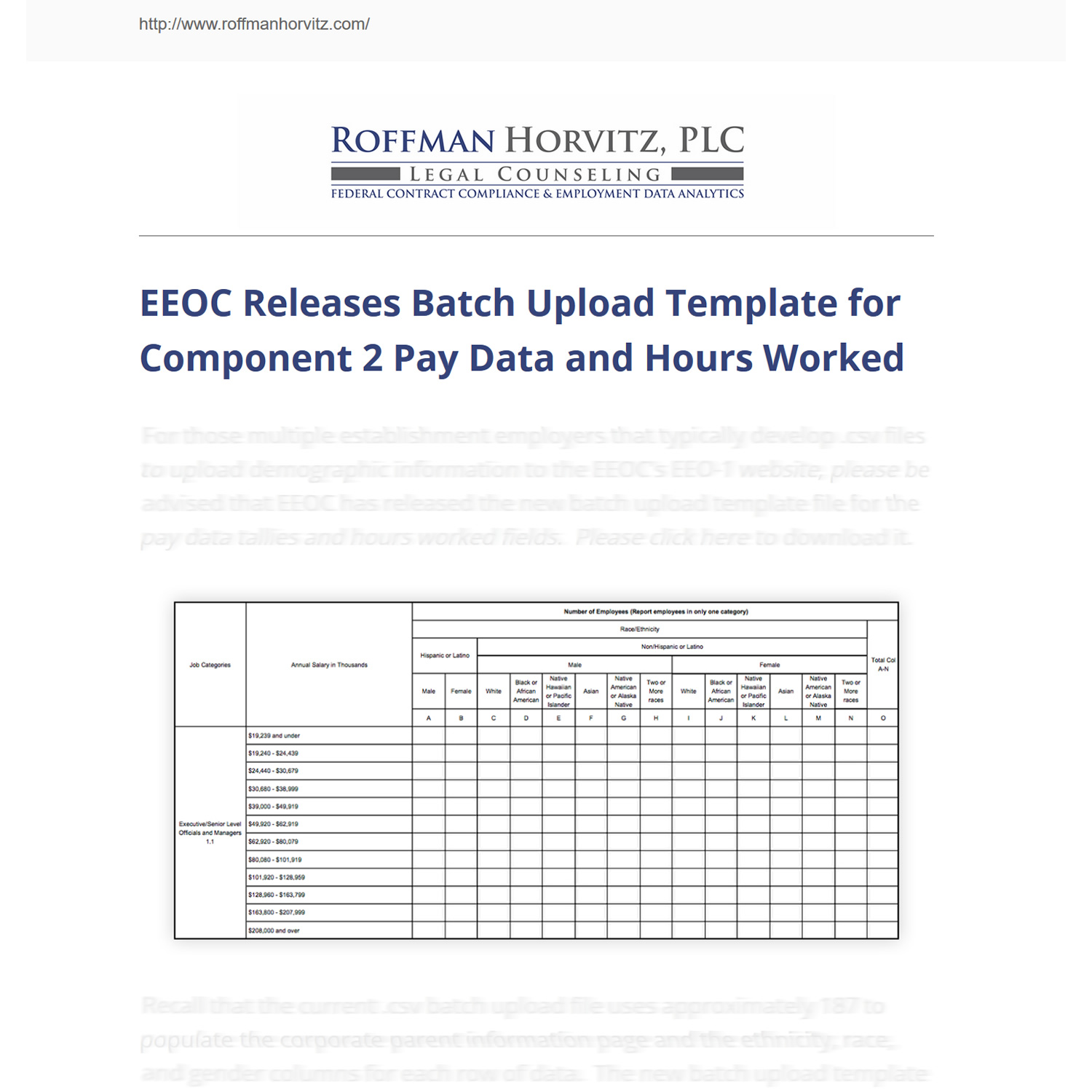Federal Court Issues Nationwide Injunction on Key Provisions of The Trump Administration's DEI Executive Orders

On Friday February 21, 2025, a federal district court issued a nationwide preliminary injunction that stopped the Trump Administration from implementing several aspects of two different executive orders. The two executive orders are:
- Executive Order 14151, signed on January 20, entitled “Ending Radical and Wasteful Government DEI Programs and Preferencing” and
- Executive Order 14173, signed on January 21, entitled “Ending Illegal Discrimination and Restoring Merit-Based Opportunity.”
Specifically, the court enjoined the “Termination Provision” of Executive Order 14151, the “Certification Provision” of Executive Order 14173, and the “Enforcement Threat Provision” of Executive Order 14173.
EO 14151
EO 14151 contains a provision that directed each federal agency, department, or commission head, in consultation with the Attorney General, the Director of the Office of Management and Budget, and the Director of the Office of Personnel Management, to terminate all equity-related grants or contracts within sixty days of the date of the executive order. The court labeled this the “Termination Provision.” As a result of the preliminary injunction, the federal government may not “pause, freeze, impede, block, cancel, or terminate any awards, contracts or obligations, on the basis of the Termination Provision.”
EO 14173
EO 14173 contained two provisions that were challenged, and the federal court labeled these the “Certification Provision” and the “Enforcement Threat Provision.”
The Certification Provision directed the head of each agency to include in every contract or grant award:
- A term requiring the contractual counterparty or grant recipient to agree that its compliance in all respects with all applicable Federal anti-discrimination laws is material to the government’s payment decisions for purposes of section 3729(b)(4) of Title 31, United States Code; and
- A term requiring such counterparty or recipient to certify that it does not operate any programs promoting DEI that violate any applicable Federal anti-discrimination laws.
Notably, (A) in the Certification Provision could have triggered False Claims Act allegations, which carried with them the threat of civil and criminal penalties.
The “Enforcement Threat Provision” stated:
“ . . . the Attorney General, within 120 days of this order, in consultation with the heads of relevant agencies and in coordination with the Director of OMB, shall submit a report to the Assistant to the President for Domestic Policy containing recommendations for enforcing Federal civil rights laws and taking other appropriate measures to encourage the private sector to end illegal discrimination and preferences, including DEI. The report shall contain a proposed strategic enforcement plan identifying
. . . (iii) a plan of specific steps or measures to deter DEI programs or principles (whether specifically denominated ‘DEI’ or otherwise) that constitute illegal discrimination or preferences. As part of this plan, each agency shall identify up to nine potential civil compliance investigations of publicly traded corporations, large non-profit corporations or associations, foundations with assets of 500 million dollars or more, State and local bar and medical associations, and institutions of higher education with endowments over 1 billion dollars.”
As a result of the preliminary injunction, the federal government may not require any grantee or contractor to make any “certification” or other representation pursuant to the Certification Provisions; and
The federal government may not bring any False Claims Act enforcement action, or other enforcement action, pursuant to the Enforcement Threat Provision, including but not limited to any False Claims Act enforcement action premised on any certification made pursuant to the Certification Provision.
Roffman Horvitz FAQs
- If this is only a preliminary injunction, what happens next?
A preliminary injunction is a temporary pause in enforcement. The typical next step would be for the court to hear evidence on the merits of each party’s position and enter a final decision. It is worth noting that at least one criteria for issuing a preliminary injunction includes the likelihood that the plaintiffs will succeed on the merits of their claims.
- Can the Trump Administration immediately appeal this preliminary injunction?
Yes.
- While all this litigation plays out in the courts, does my organization have to sign the False Claims Act certification?
No.
- The Attorney General issued a memo on February 5, 2025 directing the Civil Rights Division and the Office of Legal Policy (within the Justice Department) to submit a joint report by March 1 to the Associate Attorney General containing recommendations for enforcing civil rights laws and taking “other appropriate measures to encourage the private sector to end illegal discrimination and preferences, including policies related to DEI and DEIA.” Did the injunction pause this?
Sort of. The court did not issue an injunction to prevent the Justice Department from compiling its lists, but the Justice Department cannot bring an enforcement action against a company based on any policies related to DEI until the injunction is lifted or the litigation has come to a final end, and the court issuing that final opinion has ruled in favor of the Trump Administration.
- Remind me again – what is the March 1 Justice Department report supposed to include?
The report should address:- Key sectors of concern within the Department’s jurisdiction;
- The most egregious and discriminatory DEI and DEIA practitioners in each sector of concern;
- A plan including specific steps or measures to deter the use of DEI and DEIA programs or principles that constitute illegal discrimination or preferences,
- including proposals for criminal investigations and for up to nine potential civil compliance investigations of entities that meet the criteria outlined in section 4(b)(iii) of Executive Order 14173;
- Additional potential litigation activities (including interventions in pending cases, statement of interest submissions, and amicus brief submissions), regulatory actions, and sub-regulatory guidance; and
- Other strategies to end illegal DEI and DEIA discrimination and preferences and to comply with all federal civil-rights laws.
- So, could my organization still find itself on this list?
Yes.
- Does this pause in enforcement mean that we should pause our efforts to review policies, programs, or initiatives related to DEI?
Government contractor organizations have to unwind EO 11246 by April 21, 2025; the courts can’t stop that. But nothing in the rescinded regulatory or legal framework ever gave any organization license to engage in unlawful preferences, quotas, set-asides, or discrimination. In fact, the regulations prohibited them. All of our efforts were always aimed at ensuring that there were no barriers to equal opportunity. But the words “diversity” and “equity” have taken on a connotation, and we need to be mindful of the political risk of leaving those words on websites and in policies. We would recommend not pausing your review, and it is important that you ensure that none of your programs or initiatives affords a preference to any individual or group because of race or sex.
Download PDF of Client Update
Supporting Documents
- Memorandum Opinion - Preliminary Injunction - NADOHE v Trump
- Preliminary Injunction - NADOHE v Trump

